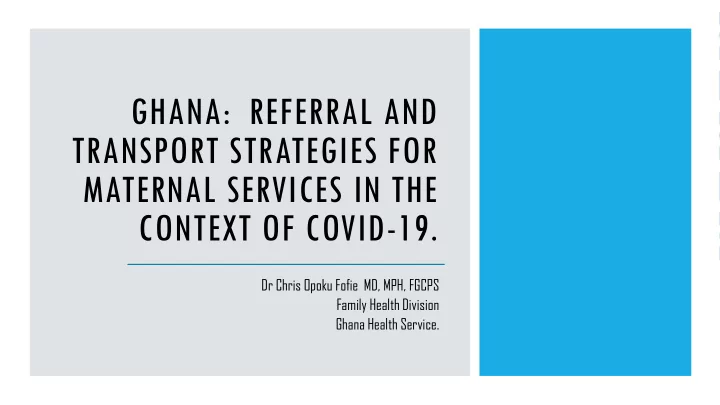

GHANA: REFERRAL AND TRANSPORT STRATEGIES FOR MATERNAL SERVICES IN THE CONTEXT OF COVID-19. Dr Chris Opoku Fofie MD, MPH, FGCPS Family Health Division Ghana Health Service.
INTRODUCTION:COVID-19 SITUATION IN GHANA • COVID-19 cases in Ghana have surpassed the 21,000 mark with 129 fatalities • All 16 regions have active cases • Severe and critical cases are managed across 71 COVID-19 treatment centres
TRENDS IN MATERNAL MORTALITY RATIO (MMR) 634 532 467 376 325 319 308 1990 1995 2000 2005 2010 2015 2017 7/9/2020 3
MATERNAL AND NEWBORN HEALTH SITUATION IN THE COVID-19 ERA. ▪ There has been a reduction in hospital attendance as a result of COVID-19 pandemic limiting services to only urgent cases in some facilities, the perception of some clients that it may be risky to seek care at health facilities out of fear of being infected. ▪ Maternal and Child Health is a key essential health service for the country. ▪ This reduction is being mitigated with the health sector interventions aimed at ensuring continuity of essential health services ▪ Improvement or stabilization of indicators can be seen in the month of May.
COVID -19 ERA MNH INDICATORS ANC ATTENDANCE MATERNAL MORTALITY 2018 2019 2020 2018 2019 2020 March 384,202 393,760 415,292 March 72 82 67 April 379.152 396,575 376,625 April 68 80 70 May 390257 406886 356287 May 98 87 82 DELIVERIES NEONATAL MORTALITY 2018 2019 2020 2018 2019 2020 March March 59221 63206 62913 506 509 465 April April 64152 65532 65981 451 529 467 May May 69869 69225 70871 636 577 374
KEY STRATEGIES: MOH/GHS ▪ All existing national policies, guidelines and protocols including referrals/feedback systems are still in use. ▪ Deployment of information technology for learning, supervision and transfer of service information to improve quality of care. (Calls, WhatsApp platforms, zoom meetings, eMPDSR) ▪ Development and dissemination of guidelines for maternal and newborn care in the context of COVID-19 to all Regions by the Family Health Division. ▪ Strengthening of triaging at all Emergency Obstetric and Newborn Care facilities. (EmONC)
STRATEGIES: FACILITY LEVEL ▪ Reorganization of service delivery and introduction of appointment system for Maternal and Newborn services. ▪ Implementation and enforcement of national COVID-19 protocols o Obligatory use of face mask in health facilities. o Hand washing with soap and water/ sanitizer o Social distancing arrangement ▪ Identification of isolation areas and designing of protocols for managing COVID-19 positive clients.
NATIONAL AMBULANCE SERVICE AT THE FOREFRONT OF REFERRALS ▪ A fleet of 350 ambulances across 295 stations (all districts and constituencies) ▪ For the year 2020(Accra) services offered: 11,184 cases. ▪ MNH services 1225 (10.9%) ▪ COVID-19 cases 2480 (22.1%)
DRONES FOR EMERGENCY MNH SUPPLIES AND COVID-19 SAMPLES. ▪ Four distribution centres across 79 districts and 641 health facilities. ▪ Average monthly deliveries of 6870(May) ▪ Carrying capacity of 1.8kg ▪ Main products delivered are: blood, plasma, vaccines, emergency medicines’ ▪ 1.7% of deliveries in may were covid-19 samples to testing sites.
KYBELE PLATFORM IN ACCRA ▪ Whatsapp based network of MNH care facilities. ▪ Emergency referrals are posted to identify the best suited facility to handle the complications in real time ▪ Multiple experts advise on management options. ▪ Ambulance service, blood bank, emergency room, NICU and theatres all prepare at a go to receive client. ▪ Feedback on management outcome, successes and failures are reported to feed into the learning experience.
COMMUNITY EMERGENCY TRANSPORT SYSTEMS (CETS) ▪ Community Motor-King Ambulance in the Upper East Region A PICTURE OF IMPROVISED ‘AMBULANCE’ OR ▪ Not all remote areas have access TRANSPORT SYSTEM to conventional ambulances. ▪ Some communities have improvised transport systems and arrangements to aid during emergencies KOICA-led project 50 motor-kings deployed in health centres/ CHPS
CHALLENGES ▪ Staff have been redeployed to perform COVID-19 related duties and some are getting infected. ▪ Increasing cost of sustaining MNH services due to the need to for more PPEs and supplies than in the pre-COVID-19 era. ▪ Delays in receiving COVID-19 test results for quick decision- making during obstetric emergencies. ▪ Declining stock of MNH supplies (shortage): PPEs, blood products, consumables, essential medicines.
THANK YOU
Recommend
More recommend